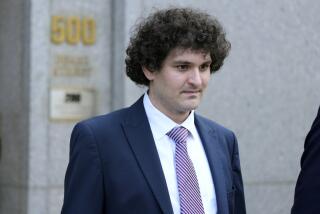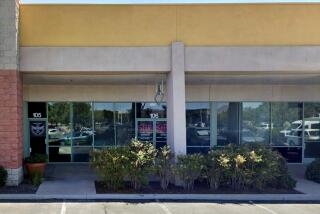5 global banks to pay $5.7 billion in fines over currency manipulation
They called themselves the Cartel, and that turned out to be an appropriate name.
Traders and sales agents used electronic chat rooms, prosecutors said, to conspire to manipulate prices in the $5-trillion-a-day foreign currency markets. They secretly marked up transaction costs, telling customers they hadn’t.
“If you ain’t cheating,” said one trader at British bank Barclays Plc, “you ain’t trying.”
The Justice Department, in a high-profile investigation into the manipulation of currency markets, announced a $5.7-billion settlement that included rare criminal charges against five global banks, including New York giants Citigroup Inc. and JPMorgan Chase & Co.
The banks’ conduct was a “brazen display of collusion” that went on for years, Atty. Gen. Loretta Lynch said at a news conference here Wednesday.
“The penalty all these banks will now pay is fitting, considering the long-running and egregious nature of their anticompetitive conduct,” she said.
Lynch said that the $2.5 billion that her department levied against the four banks in the antitrust case was the largest set of such fines ever. Citi’s share, $925 million, was the department’s largest against a single entity. The rest of the penalties were assessed by banking regulators.
Citi, JPMorgan, Barclays and Royal Bank of Scotland Plc pleaded guilty to a felony count of conspiring to violate the Sherman Antitrust Act. Switzerland’s UBS AG, which was granted immunity in the antitrust case, pleaded guilty to manipulating the global benchmark lending rate known as Libor, for London interbank offered rate.
The settlement was greeted with a wave of scorn from financial reformers, academics and other critics.
They said that, as in past settlements, no individuals were charged with a crime, that the banks could continue operating in the markets they allegedly manipulated and that the penalties would be paid by the banks’ shareholders
In addition, they noted, much of the penalties would be tax-deductible.
“I think it’s a facade of justice,” said Jimmy Gurulé, a University of Notre Dame law professor and former federal prosecutor and Treasury Department official. “It’s an attempt to make it appear that the Department of Justice is really doing something serious about the culture of corruption in banks. But the actual perpetrators, the architects of the criminal scheme, are not held accountable.”
Justice officials pointed out that the settlement doesn’t stop them from later seeking criminal charges against bank executives and other employees.
All five banks issued statements expressing regret for their actions. They said they had disciplined individuals involved and beefed up internal controls. Citigroup, for instance, said it fired nine people among the disciplinary actions it took.
The guilty pleas put the banks in a somewhat awkward position of being required to obtain waivers from regulators, including the Securities and Exchange Commission, to be able to operate their day-to-day businesses in securities markets. The SEC didn’t reply to requests for comment.
The Justice Department in court filings said it would “advise the appropriate officials of any governmental agency” on the extent of the banks’ cooperation. The banks, for their part, said they didn’t expect any problem getting waivers.
JPMorgan said it “does not anticipate future material constraints on its business activities. We have been working with regulators to help ensure we have all necessary waivers and authorizations in place.”
The banks agreed to be placed on three years of what the Justice Department called corporate probation that would include federal court supervision and regular reporting to authorities, as well as “cessation of all criminal activity.”
But, in fact, some of the banks had already entered into agreements with prosecutors in which they had promised to halt criminal wrongdoing.
The Justice Department, for instance, found that UBS’ conduct in the foreign exchange matter had violated the terms of a 2012 Libor settlement, known as a non-prosecution agreement. UBS pleaded guilty to one count of wire fraud in that case and agreed to pay $203 million in addition to the $342 million in penalties it was paying in the foreign currency exchange case.
Barclays also entered into a 2012 non-prosecution agreement in the Libor case. The bank said it was not found in formal breach of the agreement and instead agreed to pay $60 million in penalties to settle that issue.
The foreign-exchange settlements are the latest financial hits to major banks and their reputations since the 2008 financial crisis. Indeed, the list of financial industry misdeeds already settled has grown alarmingly and cuts across institutions, markets and international boundaries.
“The behavior that resulted in the settlements we announced today is an embarrassment to our firm and stands in stark contrast to Citi’s values,” said Michael Corbat, Citigroup’s chief executive.
The latest guilty pleas and fines revolve around rigging foreign currency exchange that prosecutors said lasted from December 2007 to January 2013. Prosecutors allege traders colluded with one another to manipulate two currency benchmarks that are used to establish the value of various currencies — the dollar versus the euro, for example.
“The banks pleading guilty today are not ordinary market participants. They are ‘market makers,’ representing 25% or more of dollar-euro exchange rate transactions each year,” said Assistant Atty. Gen. Bill Baer.
“As such, they were uniquely positioned to manipulate the market,” he said. “And that is what they did.”
In addition to the Justice Department fines, the Federal Reserve imposed a total of more than $1.6 billion on the five banks for the foreign exchange manipulation. Barclays also will pay a total of about $1.3 billion to settled related claims with regulators from the Commodity Futures Trading Commission, the New York State Department of Financial Services and the Britain’s Financial Conduct Authority.
Starkman reported from New York; Puzzanghera from Washington, D.C.








